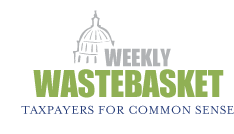
 |
 |
The Skinniest Budget Proposal
|
Volume XXII No.11: March 17, 2017
The President’s “skinny” budget request for fiscal year 2018 came out this week – sort of. These requests from newby Presidents are called “skinny” because they’re just an outline of what the new administration wants and are followed with a more robust request later. The first year budget request for a new President is always late and a little weird. This administration’s request has been a bit later and weirder.
Let’s start with length. President Obama’s recent “skinny” budget was 140 pages, President Bush’s was 175 pages; President Trump: 62 pages. Of course it isn’t about the length of the document – someone could write pages of poetry. But it is about what is in those pages. Or in this case – what isn’t. The Trump budget doesn’t project spending beyond 2018. Previous skinny budgets included ten year predictions. Also in a break with the past, the Trump skinny budget includes no revenue projections at all. And possibly most importantly there are no projections for entitlements – Social Security and Medicare – the big drivers of future debt. We can’t say how far the budget is out of balance because we only have less than a third of the spending side on the scale and nothing on the revenue side.
Even though the Administration tried to balance new defense expenditures with non-defense cuts that doesn’t mean this budget won’t quickly add to the deficit. Congress writes the dozen budget bills and the President doesn't get to pick what he likes out of it. There is no line item veto. The whole bill either goes as is or is vetoed. That means the President’s budget is a wish list. There are some cuts in the Trump budget that Obama had too and President Bush before him, clearly demonstrating that Congress doesn’t have to go along. What is a very real possibility is that the increases in defense and homeland security will be approved and much of the cuts rolled back. That equals increased deficits and debt.
The reality is that there is a parochial special interest behind about just about everything in the federal budget. Eliminate the redundant and wasteful regional rural development programs like the Appalachian Regional Commission or the Denali Commission or the Delta Regional Authority and you would get our support, but not a lot (sadly) from Congress. Or eliminating the so-called Essential Air Service (a legacy of airline deregulation) or eliminating Farm Service Agency offices or the loan guarantee programs out of the Department of Energy. We heartedly endorse those positions. We also agree that if a program has outlived its usefulness or isn’t performing it should be cut or reformed. We have long argued that Congress should be doing more oversight on federal programs. But even absent oversight and accountability you can be sure many in Congress – even in the President’s party – will fight the cuts tooth and nail.
But the bottom line is that to really hash out what the nation’s budgetary priorities are, you need to have the data. This skinny budget is emaciated and starved of details. We hope when the full budget is released in May we will be drowning in the details and able to form a realistic view of the budget situation that is facing the country.
|
|
Quote of the Week:
"We like the CBO when they agree with us. When they don't, they're a bunch of losers."
• Senator Lindsay Graham (R-SC)
responding to criticism leveled at the Congressional Budget Office by members of the GOP.
TCS rated 4-star charity!

|
 |
|
|
|
|
|
Taxpayers for Common Sense
651 Pennsylvania Ave SE
Washington, DC 2000
|



No comments:
Post a Comment